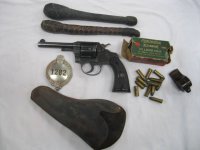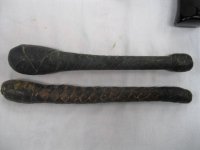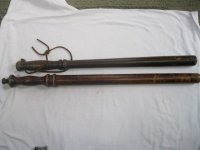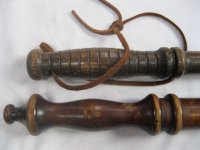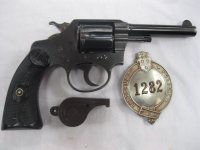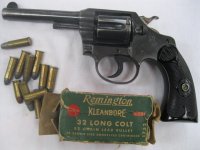You are using an out of date browser. It may not display this or other websites correctly.
You should upgrade or use an alternative browser.
You should upgrade or use an alternative browser.
Early Pittsburgh Police
- Thread starter turps
- Start date
Mike Irwin
Staff
Nice collection. I picked up a Colt Police Positive in .32 Colt Police (.32 S&W Long) last year.
Amazing that they used to be though of as perfectly adequate police handguns.
Amazing that they used to be though of as perfectly adequate police handguns.
.
Not really amazing, Mike - If you consider that the .32's were effective because modern medicine was only a gleam in some researcher's eye, back when most of them were popular police rounds, in the early 20th Century.
If a person was shot with pretty much anything back then, if not "stopped" (like a head shot), they usually died from septsis (literally:lead poisoning" - not just a wry comment) shortly thereafter.
Euro police used .32 auto's effectively for much the same reason - they worked.
.
Not really amazing, Mike - If you consider that the .32's were effective because modern medicine was only a gleam in some researcher's eye, back when most of them were popular police rounds, in the early 20th Century.
If a person was shot with pretty much anything back then, if not "stopped" (like a head shot), they usually died from septsis (literally:lead poisoning" - not just a wry comment) shortly thereafter.
Euro police used .32 auto's effectively for much the same reason - they worked.
.
Mike Irwin
Staff
They had real stopping power three to ten days later...
Blackjacks, good grief, if a police officer was caught with one today, they would hang him. Never mind that they could be used to subdue a suspect with out shooting him and if used properly cause no more than a headache. Of course if used with too much force. well, what can I say. My Uncle in Gary, Indiana used to have a couple before the powers to be prohibited them.
JHansenAK47
New member
My grandma told me a story about my grandpa breaking some guys hand with a blackjack when he was a cop. He meant to hit his hand but he didn't intend to break any bones. He didn't get in trouble for doing it either.Blackjacks, good grief, if a police officer was caught with one today, they would hang him. Never mind that they could be used to subdue a suspect with out shooting him and if used properly cause no more than a headache.
Lt. Skrumpledonk Ret
New member
Septsis Schmepsis.
You did gracefully write "usually". One notable exception would be our fearless leader, Andrew Jackson. He took one in the chest in a duel with Charles Dickenson (whom he killed moments later, albeit in a breach of etiquette). It broke two ribs, popped a lung, and remained near (and not so dear) to his heart for last 39 years of his life.
It's an interesting story I learned from "Tales of the Gun: Dueling pistols" on Utoob.
Good acquisition for turps. I'd be hard-pressed to resist hijacking the original story and claim that living history was 'inherited' instead of 'purchased'.
If a person was shot with pretty much anything back then, if not "stopped" (like a head shot), they usually died from septsis (literally:lead poisoning" - not just a wry comment) shortly thereafter.
You did gracefully write "usually". One notable exception would be our fearless leader, Andrew Jackson. He took one in the chest in a duel with Charles Dickenson (whom he killed moments later, albeit in a breach of etiquette). It broke two ribs, popped a lung, and remained near (and not so dear) to his heart for last 39 years of his life.
It's an interesting story I learned from "Tales of the Gun: Dueling pistols" on Utoob.
Good acquisition for turps. I'd be hard-pressed to resist hijacking the original story and claim that living history was 'inherited' instead of 'purchased'.
Last edited:
armoredman
New member
That's priceless stuff, thanks for sharing!
Mike Irwin
Staff
Sepsis is bodily response to a bacterial infection. It is not the same as heavy metal poisoning. Being shot does not guarantee contacting an infection or sepsis.
FWIW, the infection was not caused by the bullet itself, which was usually pretty sterile, but by the dirt and crud from the victim's skin and clothing being dragged into the wound. And people were surrounded by horse manure, dirt from unpaved streets, and a general level of filth that would kill a modern person in a few hours just from breathing the air. Since dry cleaning was unknown, and many men bathed on a "once a year, whether needed or not" basis, even a minor wound could become deadly pretty quickly.
But no one considered, even then, that a .32 was a real manstopper. What those old cops had going for them was brute force and a justice system that considered killing a cop cause for a swift encounter with a rope.
Jim
But no one considered, even then, that a .32 was a real manstopper. What those old cops had going for them was brute force and a justice system that considered killing a cop cause for a swift encounter with a rope.
Jim
ChasingWhitetail91
New member
Very nice piece of history you have there.

